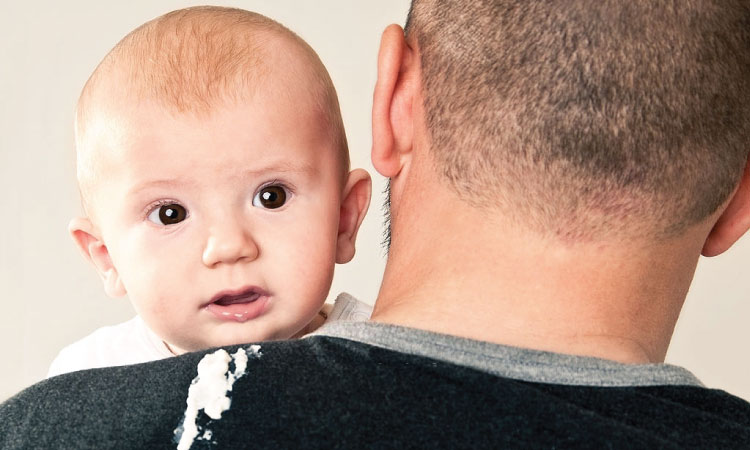Along with the excitement and utter delight, a baby brings a boatload of random concerns as well to a new mom. One of the major factors that new parents fret over is feeding. While some parents are worried if their little one is eating enough, some parents doubt if they are overfeeding the baby.
Coming to baby feeding, both overfeeding and underfeeding are equally problematic. Therefore it is important to detect the issue at right time. Overfeeding a newborn is more likely to happen than overfeeding a 6-month-old infant.
But is it possible to overfeed a baby? Well, babies are naturally capable of self-regulating their food intake. They usually demand to feed when they’re hungry and stop eating when they’re full. But, even though fairly uncommon, it is certainly possible to overfeed a baby.
If you have recently given birth to a child, this article will offer you valuable information on signs overfeeding a baby you should be aware of. Even though bottle-fed babies are more prone to overfeeding, breast-fed babies are also not 100% safe from being overfed. So it is important to understand signs of overfeeding breastfed babies as well.
What Causes Overfeeding In Babies?
Here are some top reasons that could result in overfeeding babies:
1. Misinterpreting cues
Many parents misinterpret fussiness and crying as hunger cues and right away offer food to pacify the baby. Even though many a times these behaviors signify hunger, sometimes it might have nothing to do with it. Feeding babies needlessly can end up in overfeeding babies.
Related Reading: 9 Reasons You Feel Your Baby Is Always Hungry (0-1 Years)
2. Weight/ eating expectations
Many parents have a set nutrition goal and weight gain goal that may cause them to overlook or ignore signs of satiation. For example, even though babies put on weight at different rates, if the parents think their baby is not gaining weight as per the growth chart provided by the hospital, they tend to overfeed the baby.
Likewise, some parents blindly follow the instructions in baby food and formula. If the instruction on the pack is to make a bowl of baby food or XYZ ml of formula, the parents try their best to make sure their baby eats the entire quantity prepared no matter if the baby does not require that much food. This can end up in overfeeding the baby.
3. Misconceptions about health
Many parents, especially the new parents, tend to take the parameters of a healthy child wrongly. According to them, a healthy child means a chubby child. They tend to urge the baby to drink more milk than required. This can end up in overfeeding. What they don’t understand is the physique has little to do with health.
4. Babies not able to control the milk flow
Small babies, especially those who are under 12 weeks, may not have enough control over the flow of milk while sucking. Therefore feeding them with the bottle or the nipple with a higher flow rate can end up in overfeeding as the baby tends to drink in a large quantity of milk. This so happens because they have little control over the flow.
5. Using fortified milk instead of usual baby formula
Many parents opt for fortified milk for their babies. Doctors usually suggest fortified milk only for premature babies or for babies who are experiencing deficit in specific nutrients that are vital for healthy growth and development.
These fortified formulas are more often high in calories and nutritional elements. 100 ml of fortified milk contains twice or thrice the fat content and other nutrients compared to 100 ml of normal formula or baby milk. Now you can imagine the result of overfeeding a baby formula, which is fortified.
These rich formulas are extremely beneficial for babies with a health condition. However, when a normal baby tends to receive this abnormally high amount of nutrition, it could result in overfeeding. This kind of overfeeding is hardly get noticed as the quantity of consumption is not increased
6. Ignoring baby’s signs and cues
This is one of the main reasons for feeding the baby. Babies naturally have the sense to realise when their stomach is full. The babies tend to stop feeding when they are no hungrier. Older babies turn their face away from the spoon or push the bottle or breasts away once they are full.
But, many times, parents fail to recognize these cues and compel the baby to eat more. This increases the risk of being overfed.
Related Reading: Buffalo Milk For Babies- Benefits Risks And Precautions
7 Signs You Are Overfeeding Your Baby

Babies are overfed unintentionally. A mother’s love for her infant could easily brim over, and sometimes it ends in overfeeding the baby. Infants do exhibit certain significant symptoms in such circumstances, which a mother must be aware of.
Now that you know when it is likely to overfeed the baby, the next question would be how do you know if you are overfeeding a baby? Well, a noticeable and significant increase in weight is not the only sign the baby is overfed. if you find any of the following signs in your baby, it could be an indication you are overfeeding your baby and it is time to take corrective action.
1. Babies exhibits stomach related issues
When a lot of milk is present in the body, the intestine of the baby may not able to digest all of it. Remember the digestive system and gastric juice production are not full-fledged in newborns during the initial months.
As a result, significant amounts of undigested food stays in the gut of the baby. This can bring about the following digestive issues in a baby:
- Gassiness
- Stomach pain
- Diarrhea
Feeding a crying child with stomach pain usually aggravates these issues. This irritation within the body can turn the baby cranky. If any of these signs happen within an hour or so after feeding, it could be a strong sign of stomach pain resulting from overfeeding your baby.
2. Increased farting and pooping
Frequent farting and expelled pooping could be the way the baby’s body reacts to being overfed. Besides noticeably increased farting, the baby also experiences stomach pain. Overfed baby poop tends to be extremely smelly and slightly watery.
Related Reading: How Often Should A Breastfed Baby Poop
3. Frequent spit-up and burping
Spitting is common among both breast-fed and formula-fed babies. Overfeeding, however, could increase its intensity and frequency. The excessive amount of milk can put pressure on the little stomach of the baby. As a result, the stomach stretches beyond its limits. Therefore, the excess milk more often tends to make its way back into the baby’s mouth via regurgitation.
Likewise, swallowing milk quickly from a bottle can end up in gulping air. In this case, when you make the baby burp, the baby tends to spit up some milk. This could be an indication baby is overfed.
4. Overfed babies may not sleep through the night
Hunger is not the only factor that potentially contributes to the constant wakefulness of the baby during sleep. Overfeeding can also hinder the baby’s sleep. Overfed can make the baby a colicky baby. And all those gassiness and frequent passing of loose stools can hinder their good night’s sleep.
5. An unexpected reduction in growth
By encouraging babies to eat more food, parents think they are trying to boost their growth and development. But overfeeding can result in a reduction in growth. Loose motions and vomiting are two common signs of overfeeding. A lot of nutrients are also expelled through the poop or vomit before the body gets a chance to absorb it. This could lead to depletion of vital minerals and vitamins thereby impacting the growth of the baby.
6. Low energy in babies
Overfed babies are often found to be less active. The discomfort caused by being overfed affects the energy levels of the baby, leading them to be lethargic all the time. Frequent vomiting of gassiness can make a baby want to just lie down.
7. Unmistakable increase in diaper change
If you notice that the diaper needs to be changed more often than normal, it could be a sign of overfeeding.
What Happens If You Overfeed A Baby?

Here are some side effects of overfeeding your baby
Overfeeding could worsen acid reflux in the baby
If the baby is born with gastroesophageal reflux disease (GERD) or is prone to acid reflux, overfeeding can make the condition worse.
Related Reading: Ajwain Water For Babies- Benefits, Methods And More
Overfeeding baby vomiting
While overfeeding a breastfed or formula-fed baby, vomiting can be considered as an extreme side effect that affects the baby. Overfed babies more often vomit after a feed. Chronic vomiting might adversely affect the nutrient intake and, thus can create many health problems in the long run.
Overweight and obesity
Because newborns are continually given extra food, the intake excess calories starts accumulating in their body. This results in excessive weight gain. If over-feeding continues, eventually the baby’s body starts to adjust itself to absorb and store these extra nutrients. This could increase the chances of babies contracting obesity at this small age.
Under weight and reduced growth
Constant loose motions and throwing up of milk are common among overfed babies. This could deplete the availability and absorption of vital nutrients that promote the growth and development of babies. Therefore overfed child may experience reduced growth and lack of energy.
Can You Overfeed A Baby When Starting Solids?
By the time the baby starts solids they usually refuse to take another spoon of solid once they are full. However, similar to bottle feeding and breastfeeding, there is still a possibility to overfeed a baby who starts solids.
This more often happens when the mother or caregivers encourage sand compel the baby to eat an entire jar of puree they prepared (assuming it is the right proportion). Therefore, focus on signs of fullness when it comes to feeding baby solids.
Related Reading: 10 Indian Baby First Foods 4-6 Months
Moreover, some parents feed their children with the television on. Children feel as long as they are eating, they will get to watch the TV. This makes them eat more that they actually need to. Watching TV and overeating is something even adults usually do.
How Do You Treat An Overfed Baby?
If your baby fails to gain appropriate weight for his or her age or appears to be gaining too much weight, you should contact baby’s doctor. Similarly, if you notice your baby is having persisting gastric issues or the baby is always cranky, consult the doctor. If these signs are due to overfeeding, the doctor will guide you to solve the issue.
Who Is At Risk Of Overfeeding?

Any baby can subject to overfeeding. Still, some particular group of babies is found more at risk of this issue:
Babies less than 12 weeks old: This age group has developmental restrictions that limit their capacity to manage their milk consumption. These babies are unable to regulate the flow of milk, causing them to consume far more than is necessary
Bottle-fed babies: Bottle-fed babies are more likely to overfeed because it is more difficult for them to control the flow of milk from a bottle when compared to that of a mother’s breast
Formula-fed babies: They are also more likely to be fed nutrient-dense fortified formula needlessly
Conclusion
Many of the signs of overfeeding breastfed babies and formula-fed babies (like frequent spit-up, gassiness, and burping, vomiting, fussiness, and irritability) are not rare among babies in the first few months of their life. Exhibiting these signs once in a while is not a sign of overfeeding a baby. However, if these signs are noticed frequently, bring it to the notice of your pediatrician without delay.
Knowing your baby’s hunger cues and fullness signs might help alleviate any concerns you have about overfeeding. Remember, starting overeating at this early stage of life baby can contribute to lifelong health issues (like obesity). Healthy habits should begin from the first day of life. Sticking to the type and amount of formula prescribed by the pediatrician and respecting the baby’s refusal to eat more will help to avoid many overfeeding traps.

